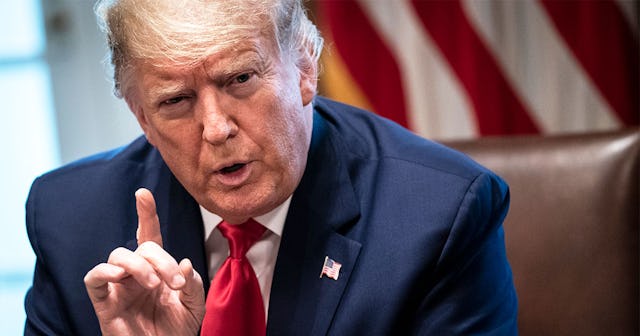Scapegoating Is An Expected Response To The COVID-19 Pandemic, And It's Trump's Favorite Tool

Despite being the only country in the world to continue to massively fail at containing COVID-19, Donald Trump insists upon referring to the virus as “the China virus” or “kung-flu.” What are his intentions when he uses these terms? Is he simply labeling COVID-19 with the place it came from, because the virus did, after all, originate in China?
LOL, no. Trump and others who refer to COVID-19 with racist names are engaging in scapegoating because the United States has failed worse than any other country at containing COVID-19. Trump may have taken a few half-assed measures early on in the pandemic, like banning some travel from China, but he failed bigly, hugely, tremendously, at other critical measures of containment, like testing, quarantine, and contact tracing. He needs to redirect everyone’s attention elsewhere. He needs a scapegoat. Pay no attention to the man behind the curtain.
In pre-World War II Germany, Hitler targeted Jewish people as a scapegoat to blame for Germany’s crumbling economy and hyperinflation, each of which were caused by the severe terms of the Treaty of Versailles following Germany’s defeat in World War I. In this case, though, Hitler wasn’t trying to distract from his own public failings (except perhaps from his embarrassing failure at art school, which he does of course blame on the Jews); he just needed a singular focus upon which to unite those he hoped would support him in his grab for power.
Of course, scapegoating is not a tactic reserved for power-hungry malignant narcissists. Regular, everyday people engage in scapegoating when confronted with their own failings. Have you ever stubbed your toe on a piece of furniture and blamed the piece of furniture for being in your way? Scored low on a test and blamed the makers of the test for writing bad test questions? Lost an important game in a team sport and blamed a single player for their one mistake? All of these are examples of scapegoating: avoiding your own faults or failings and absolving yourself of guilt by placing blame elsewhere where it doesn’t belong.
The key feature of the scapegoat is that the chosen carrier of blame is vulnerable and/or cannot fight back. This allows for persecution of said person or group to persist in a way that offers a continued distraction from the real source of a problem, and, in some cases, offers a means to unify a group that may otherwise not have reason for cohesiveness. Scapegoating also creates a villain, which implies there must also be a hero.
If China is the scapegoat in Trump’s interpretation of the disaster that has been COVID-19, I wonder who Trump expects people to see as the hero in this scenario.
But why is scapegoating such an effective tool in a power-hungry narcissist’s toolbox? Why is scapegoating something humans do in the first place? According to Mark Schaller, a professor of psychology at the University of British Columbia and co-author of Social Psychology of Prejudice, scapegoating, in particular when it comes to scapegoating with regards to disease, is part of our evolutionary makeup. Schaller told NPR that humans have evolved to distrust outsiders partly as a means to avoid infection, a response that he calls “the behavioral immune system, a kind of psychological parallel to the physical immune system.” This instinct is “no longer adaptive,” Schaller told NPR, “but we’re stuck with our ancient psychology, leaving us wary and with negative consequences for today.”
Most of us have heard of “ingroup/outgroup thinking,” a phenomenon that influences social behavior for everything from sports team loyalty to political ideologies to patriotism. These habits stem from the same evolutionary adaptations Schaller discussed with NPR, and though they can be, quite literally, fun and games in certain situations, ingroup-outgroup thinking also leads to prejudice, intolerance, and the fracturing of social stability.
Here in the U.S., hate crimes against Asian-Americans have surged dramatically since the onset of the COVID-19 pandemic. A July study demonstrated a marked increase in both interpersonal and institutional hate-crimes against Asian-Americans. Donald Trump’s repeated reliance on terms like “China virus” and “kung flu” is a calculated move to get Americans to think “THEM” and “THEIR FAULT” whenever they think or hear about COVID-19. In March, Trump agreed not to use the term “China virus,” but has used it since, most notably during the recent Republican National Convention, as well as the term “kung flu.”
Trust: This is not an accident. Donald Trump knows what he is doing. His administration’s handling of the coronavirus (along with many other problems) has put the United States under a magnifying glass that has revealed some of our ugliest flaws, the greatest of which is that we are apparently foolish enough to elect a person so obviously unfit to lead a nation. Donald Trump knows that if he wants to be elected for another term, he will have to distract from his many failings by scapegoating.
Ingroup-outgroup thinking may have evolved as a protective trait, but it no longer serves us. And if we want to get off this merry-go-round of intolerance, bigotry, and violence, our only choice is to selectively evolve away from this maladaptive and primitive way of thinking. It’s not a China virus. It’s a coronavirus, one that could have originated anywhere but happened to originate in China… and then found its greatest foothold here in the United States. And the fault for that lies squarely on the shoulders of our current administration.
This article was originally published on